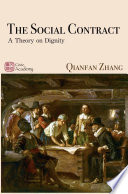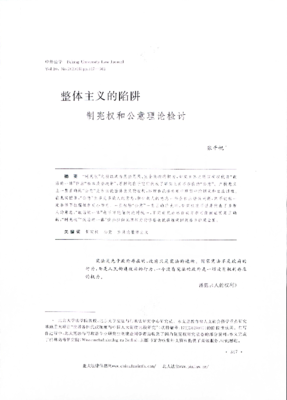
Qianfan Zhang, Ph.D.
Professor of Law
Peking University
Born in 1964 in Shanghai, People's Republic of China
Studied Comparative Constitutional Law at Peking University
Arbeitsvorhaben
A Comparative Study of the Central-Local Relationship
The proposed project is to continue and expand my comparative research on the central-local relationship, focusing on the German federal system and its relevance to legalizing the central-local relation in China. The ultimate purpose of this research is to re-examine the central-local relationship that has puzzled China's governance for a long time. Although scholars in China have paid close attention to this problem, they have not been able to put forward any constitutional theory that can effectively resolve the growing central-local conflicts. Limited by its anachronistic understanding of unitary sovereign power, traditional Chinese jurisprudence has failed to recognize the need to balance the plurality of local interests against national uniformity, much less to propose a new institutional design for such balance. By contrast, the research on vertical separation of powers has produced many interesting insights in the federalist states. In Germany, for example, the central-local (i.e., federal-state) disputes are usually resolved through constitutional litigations, which has produced abundant case decisions that rather effectively resolved the conflicts between national uniformity and local autonomy. During my visit, I plan to compare the constitutional experience of Germany and other major states, e.g. the United States, Canada, Australia, and India, generalize the constitutional principles that regulate the central-local relationship, and propose plausible scenarios for the resolution of central-local conflicts in China. Preliminary study illustrates the need to legalize the central-local relationship and to allocate the central and local power most effectively. Thus, the central government should not busy itself with regulating everything; it has neither the right nor the obligation to meddle in affairs of purely local nature.Recommended Reading
Zhang, Qianfan. "Judicial Reform in China: An Overview." In China's Socialist Rule of Law Reform under Xi Jinping, edited by John Garrick and Yan Chang Bennett, 17-29. New York: Routledge, 2016.
-. "Legalising Central-Local Relations in China." In Central-Local Relations in Asian Constitutional Systems, edited by Andrew Harding and Mark Sidel. Oxford: Hart, 2015.
-. "A Constitution without Constitutionalism? The Paths of Constitutional Developments in China." International Journal of Constitutional Law 8, 4 (2010): 950-976.
Kolloquium, 15.05.2018
Der Gesellschaftsvertrag als Metaverfassung
Die Theorie des Gesellschaftsvertrags ist von vielen diskreditiert worden - aufgrund von Missverständnissen und der Nichtbeachtung ihrer wesentlichen Funktion bei der Gründung eines legitimen Verfassungsstaats.
Üblicherweise stößt man im Verhältnis von Gesellschaftsvertrag und Verfassung auf mehrere, miteinander zusammenhängende Missverständnisse. Für gewöhnlich wird vorausgesetzt, dass die Verfassung der Gesellschaftsvertrag und damit das höchste positive Recht einer Nation ist, über der es keine höhere, grundlegendere bindende Norm gibt. Folglich übt die "verfassungsgebende Gewalt", die das "souveräne Volk" repräsentiert, die höchste und unbegrenzte Macht während der Verfassungsgebung aus, ein revolutionäres Ereignis, das vom ersten Moment an die Grundordnung schafft und durch keinerlei vorgängig geltende Normen gebunden sein kann. Die von Rousseau und Sieyès entworfenen ganzheitlichen Konzeptionen wurden überall auf der Welt von Demagogen wie Hugo Chávez benutzt, der die jahrhundertealte Verfassungsordnung Venezuelas innerhalb eines Jahres nach seiner Machtübernahme als Präsident zerstörte.
Ich beginne meinen Vortrag mit der Geschichte des Verfassungscoups in Venezuela und einigen anderen Entwicklungsländern und kritisiere die ganzheitlichen Verfassungstheorien von Rousseau, Sieyès und Carl Schmitt im Überblick. Obwohl Rousseau an der Konstruktion einer vertretbaren Theorie des Gesellschaftsvertrags scheiterte, ist ein Gesellschaftsvertrag trotzdem für die Legitimität eines Staates und seiner Verfassung unverzichtbar, so meine These. Danach mache ich Sie mit meiner Theorie des "skeptischen Experimentators" vertraut. Diese geht zurück auf eine wegweisende Urteilsbegründung des Richters Holmes, der 1919 in einem Fall vor dem Supreme Court der USA eine abweichende Meinung zugunsten der Redefreiheit vertrat, die den Boden für einen "begrenzt mehrheitlichen" Gesellschaftsvertrag bereitete.
Im Folgenden möchte ich dann einen prototypischen Gesellschaftsvertrag skizzieren, eine "Metaverfassung", die als Grundlage für einen legitimen Verfassungsstaat dient. Mein Vortrag endet mit einer Erörterung möglicher Folgen für Verfassungsgebung und Revisionsprozesse. Dafür ziehe ich Südafrika nach der Apartheid als positives Beispiel heran - dieses Land gestaltete seinen Gesellschaftsvertrag erfolgreich als einen zweistufigen verfassungsgebenden Prozess.
Publikationen aus der Fellowbibliothek
Zhang, Qianfan (Highland Park, 2025)
The social contract : a theory on dignity
Zhang, Qianfan (Abringdon, 2018)
Against the holistic temptations
Zhang, Qianfan (Getzville, 2018)
Guarding against holistic mothodology : a critique of theories on constituent power and general will
Zhang, Qianfan (New York, 2016)
Human dignity in classical Chinese philosophy : Confucianism, Mohism, and Daoism
Zhang, Qianfan (2014)
Xianfa xue daolun : yuanli yu ying yong Faxue xin jieti
Zhang, Qianfan (Xiang gang, 2013)
Manifesto of constitutional China
Zhang, Qianfan (Oxford [u.a.], 2012)
The constitution of China : a contextual analysis Constitutional systems of the world
Zhang, Qianfan (Beijing Shi, 2011)
The principles of constitutional law Principles of constitutional law

Im Kolleg entstanden 27.12.25

Im Kolleg entstanden 01.05.18
Köpfe und Ideen 2018
„Die dritte – föderale – Republik China wird irgendwann kommen“
Qianfan Zhang im Interview mit Maximilian Steinbeis

